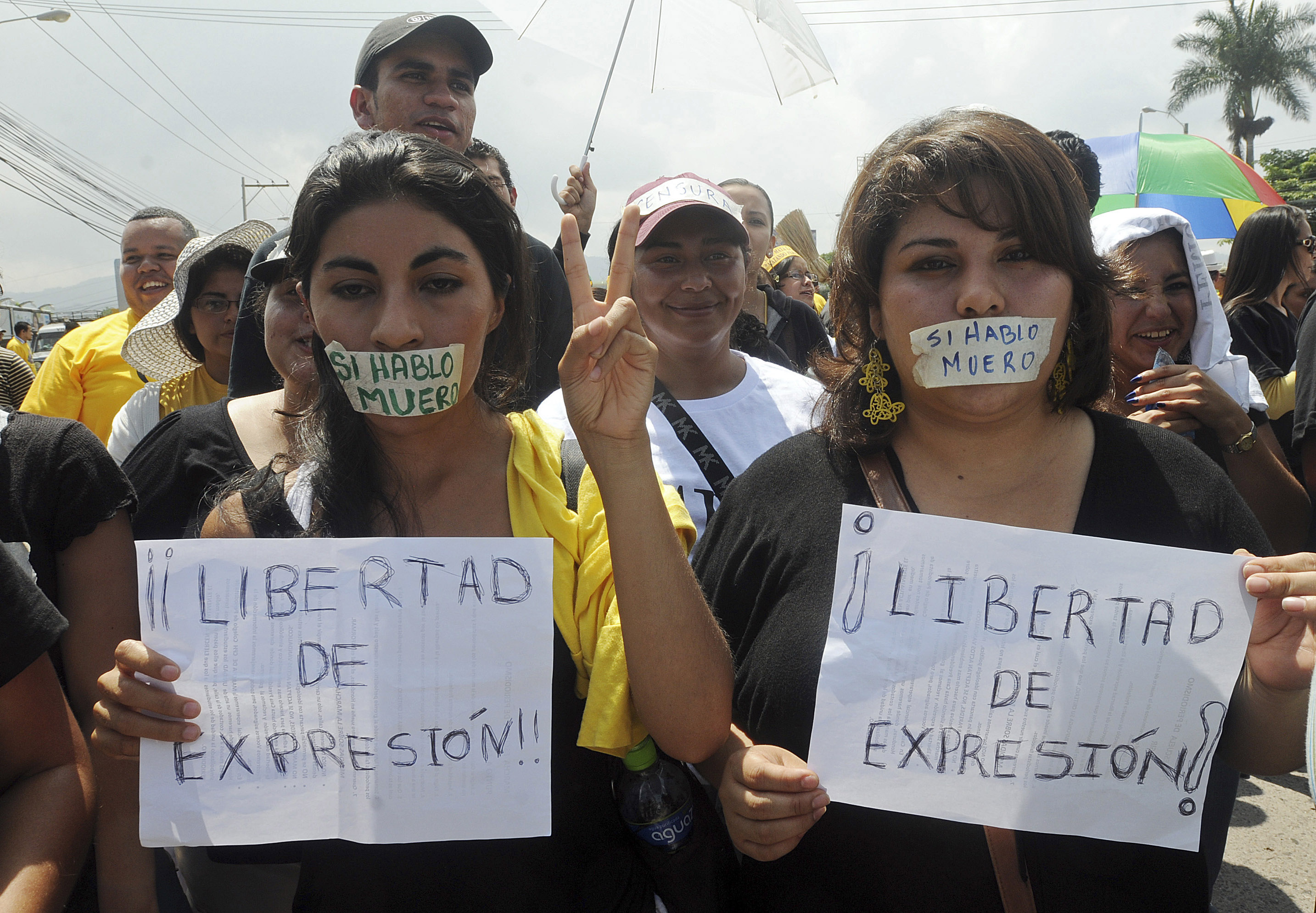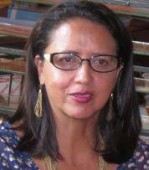Crimes Against Journalists: The State Prosecutor is Merely a Machine for Counting Deaths
by Dina Meza Translated from Spanish by Katherine Wingfield-Dobbs. / October 30, 2017 / No comments

Women rally for freedom of expression in Honduras. Image via the Latin Correspondent.
The responses from the Honduran State are inadequate in the face of the serious violence against journalists that has left around 72 crimes. In spite of the President of the Republic himself, Juan Orlando Hernández, in demagogic form, saying that the investigations have gone to a higher office, impunity is maintained in 91% according to data from the National Commission for Human Rights (CONADEH).
The State Prosecutor, which is the body charged with acting to combat impunity, has become merely a machine to count deaths, and argues that they cannot provide details of the cases because it will hinder the investigations. However, this asseveration is already wearing thin because society has never had a report on what they are actually investigating.

- Honduras has one of the world’s highest murder rates. It is also one of the most dangerous countries to practice journalism, ranking 129th out of 180 in the 2014 World Press Freedom Index. Journalists are regularly threatened, attacked, and killed for their work. The Honduran government fails to punish those who use violence against reporters, essentially granting them impunity. This space will be dedicated to examining the lack of protection for Honduran journalists exercising their profession. Topics will include the use of state-sponsored advertising as a mechanism to reward or punish publications, and censorship and self-censorship as hindrances to democratic progress.

- Born in Cofradía, Honduras, Dina Meza has been recognized by PEN International, Amnesty International, Index on Censorship and Reporters without Borders for her work as a journalist and human rights advocate. Currently, Dina is the driving force behind the creation of Honduras PEN Centre. In 2013, she wrote “Reign of Terror,” an in-depth report on threats to Honduran journalists for Index on Censorship’s magazine. In 2014, she was named one of Reporters Without Borders’ “100 Heroes and Heroines of Information.”
On their recent visit to Honduras in September, Reporters Without Borders – represented by Emmanuel Colombié, Director for Latin America of the organization – recommended to the State Prosecutor that a protocol should be created to determine each journalist’s death, if they are related to carrying out their profession, as well as indicating that the State must establish a public prosecutor specialized in investigating such attacks.
Every death carries with it silence which creates self-censorship in the press – leaving each crime in the nebula sends out a message of death and fear. “An attack on the principals of transparency and accountability as well as on the right to hold opinions and take part in public debates, which are essential in a democracy. When such crimes remain unpunished, this encourages similarly violent acts and can result in the silencing and self-censorship of communicators”, pointed out the UN’s Reporter for Freedom of Expression and Opinion.
The violence the country lives with is brutal, despite the government’s attempts to minimize it with the aim of being re-elected in the next elections.
This violence has drawn international attention in a country which occupies second position, after Mexico, where exercising the profession is very dangerous, putting the country 140th in the 2017 world classification on press freedom, according to Reporters Without Borders.
One conclusion which could be reached is that the intolerance of diversity of ideas provokes deadly attacks against social commentators and journalists, whilst the State of Honduras is incapable of demonstrating otherwise.
The violence is at its worst this year, 2017, a year in which a general election will be held where President Juan Orlando Hernández seeks re-election, despite it being illegal according to national legislation. There is no truce for life.
UNESCO is driving an Action Plan to combat impunity for attacks on journalists in Honduras. They recently met with various sectors and set a goal for it to be launched in 2018. Although the international community is horrified with this situation which prejudices freedom of expression by parts of the Honduran State, there are few advances.
In 2015, the Law of Protection for human rights defenders, journalists and social communicators and operators of justice was approved, a product of which has been the establishment of the Protection Mechanism in favor of these sectors – but it has serious limitations.
One of these limitations is that all sectors are placed in the same category without taking into account that there is differentiated violence for the activities each carries out. That makes it almost impossible to focus on finding tough actions that will put a stop to the attacks.
Another problem is that the Law does not give the opportunity for balance and that decisions made are made fairly – here the Honduran State has the advantage of crushing those proposals which they do not like because they have majority representation in the National Congress for Protection. The solution would be a rapid reform to the Law and also to remove the National Secretary for Security and Defense from the bodies represented there, given that 50% of those who provoke violence against journalists come from these institutions.
But it is important to highlight that if there is a State that generates violence against journalists, we cannot hope that it will act against impunity because it is not going to control itself. It would need a political and ethical iron will to finally do something.
When they kill a journalist, they are placing a deadly trap on democracy. The role played by journalists and social commentators is vital because by not allowing them to exercise their profession peacefully, it deprives society of information and freedom of expression dies every day.
It must be added that another thing which does not contribute to the solution is the division of the guild and that the College of Journalists has not taken its role as protector of the sector seriously: its performance is precarious and it makes a statement only when close to managers or when the sector it represents is affected, but on other attacks it maintains a dismal silence.
How should we deal with it then?




